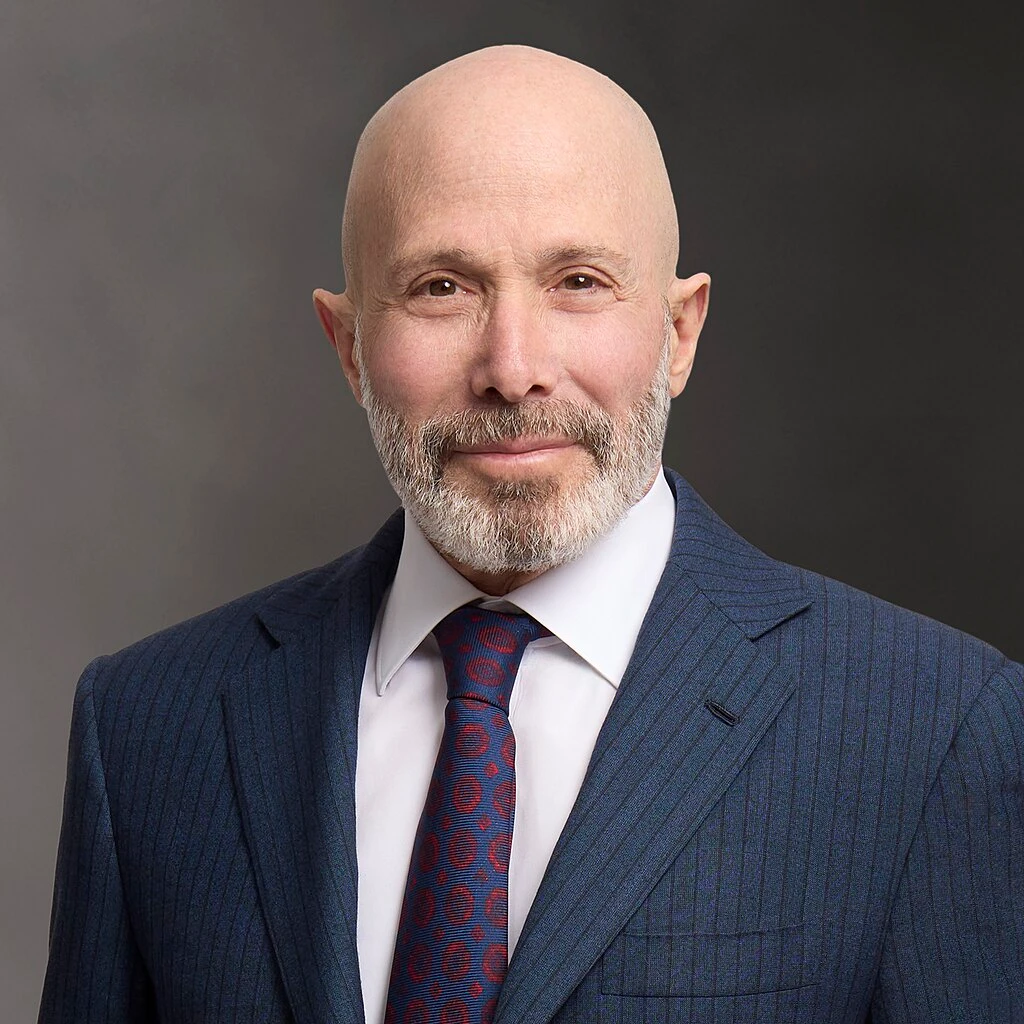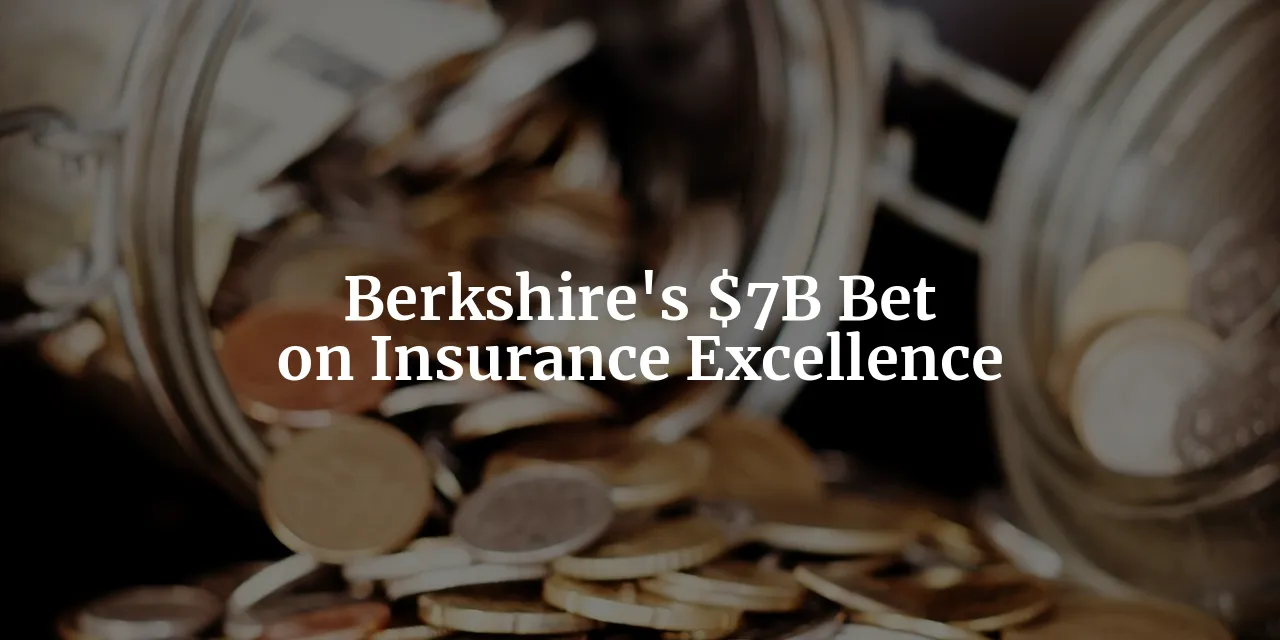Tags: Chubb
This fanpage is not officially affiliated with Berkshire Hathaway: Disclaimer
We review the recently revealed $7 billion investment in Chubb, a strategic move by Warren Buffett towards insurance excellence. Explore Chubb's impressive financial performance, market opportunities, and potential for growth. This partnership promises significant value creation for shareholders.

Introduction
Berkshire Hathaway, the conglomerate led by the legendary Warren Buffett, has recently made headlines by quietly amassing a $6.7 billion stake in Chubb, a prominent New York-listed insurance company1. This significant investment marks a notable move in a period where Berkshire has been more inclined to sell than buy, reflecting the challenges it has faced in identifying worthwhile investments. With a record cash position of $189 billion in the first quarter1, Berkshire's strategic decision to invest in Chubb is a testament to the company's enduring commitment to finding value in quality businesses ↗.
Warren Buffett has a long-standing history of investing in the financial services sector. His portfolio includes substantial stakes in Mastercard and Bank of America, showcasing his preference for companies with strong fundamentals and robust growth potential 1. In the current economic climate, characterized by market volatility and economic uncertainty, Berkshire's investment choices are under intense scrutiny. The decision to invest in Chubb is particularly intriguing given the conglomerate's recent conservative approach to cash management.
The purpose of this article is to delve into why Chubb represents a strategic fit for Berkshire Hathaway and what this investment means for shareholders. By examining the alignment with Berkshire's business mix, market opportunities, financial performance, and potential for future acquisitions, we aim to provide a comprehensive analysis of this significant investment.
Buffett's investment philosophy has always been centered around quality companies with strong fundamentals and long-term growth potential. Chubb, with its impressive market value growth of over 75% in the past five years to more than $100 billion1, fits this mold perfectly. The company offers a wide range of insurance products, including home, car, and liability insurance, and is led by Evan Greenberg, son of industry veteran Maurice "Hank" Greenberg1. This combination of robust leadership and diverse product offerings makes Chubb a compelling addition to Berkshire's portfolio.
The Strategic Fit: Why Chubb?
Let us try to answer this question with a checklist regarding 6 prominent dimensions:
1. Alignment with Berkshire's Business Mix
Chubb's diverse range of insurance products, from home and car insurance to liability coverage, resembles Berkshire Hathaway's existing insurance businesses, such as Geico3. It is not known if Berkshire would buy Chubb in its entirety (see 6.), but this alignment would not only enhance Berkshire's insurance portfolio but would also provide opportunities for synergies and cross-selling. The integration of Chubb's offerings with Berkshire's existing subsidiaries would lead to a more comprehensive and competitive insurance business, further solidifying Berkshire's excellent position in the market.
2. Market Opportunities in Insurance
The insurance market has been tightening in recent years due to factors like severe weather events, social and economic inflation, and higher interest rates3. This environment has allowed insurance companies to raise premium rates substantially, a trend that Chubb has capitalized on effectively. By increasing premium rates, Chubb has been able to enhance its revenue streams and maintain profitability, making it an attractive investment for Berkshire Hathaway.
3. Financial Performance and Profitability
Chubb's financial metrics are nothing short of impressive. The company reported a 20.3% surge in net profits last quarter, coupled with a property and casualty combined ratio of 86%3. These figures highlight Chubb's operational efficiency and its ability to generate substantial profits, even in a challenging market environment.
4. Chubb's Pricing Power
One of Chubb's standout features is its ability to command higher premiums due to its fair and lenient claims process3. This approach not only enhances customer satisfaction but also leads to higher margins. By maintaining a reputation for fairness and reliability, Chubb has been able to attract and retain high-quality clients, contributing to its overall profitability. This pricing power aligns with Buffett's preference for companies that cater to wealthier customers and can sustain premium pricing.
5. Chubb's Long-Term Growth
Over the past decade, Chubb has consistently outperformed its peers, achieving a 10% average underwriting margin, significantly higher than the industry average of 4%3. This consistent performance underscores Chubb's ability to navigate market challenges and deliver long-term growth. For Berkshire Hathaway, investing in a company with such a strong track record aligns perfectly with its strategy of focusing on quality businesses with sustainable competitive advantages.
6. Potential for Full Acquisition
Given Chubb's strong financials and strategic fit, there is speculation that Berkshire may consider acquiring the entire company3. Such a move would not be unprecedented, as Berkshire has a history of successful acquisitions in the insurance sector, including the $11.2 billion purchase of Alleghany Insurance in late 20223. A full acquisition of Chubb could provide Berkshire with an even more significant presence in the insurance market, offering potential for higher returns and greater market influence.
Thus, Chubb represents a strategic fit for Berkshire Hathaway on multiple fronts. Its alignment with Berkshire's existing businesses, ability to capitalize on market opportunities, impressive financial performance, and potential for future growth make it a compelling addition to the conglomerate's portfolio. For shareholders, this investment underscores Berkshire's commitment to finding value in quality businesses and reinforces the long-term growth potential of the conglomerate.
Financial Insights and Market Reactions
When Berkshire Hathaway unveiled its $6.7 billion stake in Chubb, the market responded with enthusiasm. Chubb's share price soared by 6.3% to $268.96 following the disclosure2. This immediate uptick underscores the market's recognition of Berkshire's investment acumen and the confidence it instills among investors.
The "Berkshire Effect" is well-documented; when Warren Buffett's conglomerate invests in a company, it often leads to increased investor confidence and a subsequent rise in stock prices. Cathy Seifert aptly noted, "Chubb is an attractive equity investment for Berkshire"2. This sentiment is echoed by the market's reaction, suggesting that Berkshire's endorsement acts as a powerful catalyst for investor optimism.
Detailed Financial Metrics
To provide a clearer picture of Chubb's financial standing, here is a summary of approximate key metrics as of May 23rd 2024:
| Chubb Metric | Value |
|---|---|
| Market Cap | $107 billion |
| Share Price | $263 |
| P/E Ratio | 12 |
| Dividend Yield | 1.3% |
Chubb's P/E ratio of 12 is particularly noteworthy when compared to other insurers trading at single-digit P/E ratios3. This indicates a relatively higher valuation, reflecting investor confidence in Chubb's growth prospects and financial health. In the competitive property and casualty insurance industry, Chubb has demonstrated more consistent earnings growth compared to peers such as The Progressive Corporation (PGR) and The Travelers Companies (TRV)8. This consistency is a testament to Chubb's robust business model and effective risk management strategies.
Chubb's current dividend yield stands at around 1.3%, following a quarterly payment of $0.918. For income-focused investors, this yield represents a reliable source of income, underscoring Chubb's commitment to returning value to its shareholders.
Chubb's valuation presents significant upside potential. A DCF model estimates Chubb's fair value at around $390, which is approximately 43% above the current stock price8. This substantial upside potential reflects the market's recognition of Chubb's growth trajectory and financial robustness.
While Chubb's financial outlook is promising, potential risks must be acknowledged. These include:
- Margin Deterioration: Any decline in underwriting margins could impact profitability.
- Catastrophic Losses: Significant weather events or other catastrophes could lead to substantial losses8.
Chubb may continue to deliver strong financial performance and shareholder value - risk is at the core of any insurance business.
Leadership and Corporate Governance
Berkshire Hathaway places a high value on exceptional management. Let's explore this aspect in relation to Chubb.
At the helm of Chubb is Evan G. Greenberg, a seasoned executive with a rich background in the insurance industry. Born in 1955, Greenberg's career spans over four decades, including a 25-year tenure at AIG and a transformative leadership role at ACE, which acquired Chubb in 2015 for $28.3 billion7. Under his stewardship, Chubb has become the second-largest publicly listed insurance company in the U.S.
Greenberg's management philosophy is deeply aligned with Berkshire Hathaway's focus on long-term value creation. He emphasizes a culture of organic growth and strategic acquisitions, supported by a flat management structure that prioritizes talent management and financial outperformance5. This approach has enabled Chubb to achieve industry-leading underwriting profitability and consistent growth.

Chubb's governance practices reflect a conservative and prudent approach, particularly in managing reserves. The company maintains $80 billion in loss reserves and is known for recognizing bad news early, a strategy that ensures financial stability and resilience5. This conservative approach aligns well with Berkshire's own risk management ethos.
Cultural Fit. Chubb's culture of organic growth and successful acquisitions complements Berkshire's business practices. The company's focus on underwriting excellence and long-term financial performance resonates with Berkshire's investment philosophy, making Chubb a strategic fit within Berkshire's diverse portfolio5.
Greenberg's involvement in various boards and committees further underscores his leadership credentials. He has served on the board of The Coca-Cola Company and is actively involved in the US-China Business Council7. His advocacy for global trade agreements and efforts to improve U.S.-China business relationships are particularly relevant as Chubb expands its footprint in Asia.
During the COVID-19 pandemic, Greenberg called for public-private partnerships to manage pandemic risk, highlighting his forward-thinking approach to risk management7. This initiative aligns with Chubb's strategic objectives and underscores the company's commitment to innovative solutions in the face of global challenges.
Greenberg's efforts to improve U.S.-China business relationships have significant implications for Chubb's expansion in Asia. By acquiring stakes in Huatai Insurance and Cigna Group's Asian businesses, Chubb is well-positioned to capitalize on growth opportunities in the region7. Greenberg's advocacy for better business and political relationships between the U.S. and China is a strategic advantage for Chubb's global operations. You can find out quite a bit about Evan Greenberg's stance on international affairs in the following interview "Trade and Investment with China is in the U.S. National Interest | Evan Greenberg". Interestingly, Greenberg is also Executive Vice Chair of the National Committee on U.S.-China Relations:
In turn, investing in Chubb and BYD might signify Berkshire Hathaway's strong support for fostering deep trade relations between China and the United States.
Chubb's robust financial performance, strategic leadership, and conservative governance make it a compelling investment for Berkshire Hathaway. The synergy between Chubb's and Berkshire's business philosophies promises a fruitful partnership, poised to deliver long-term value to shareholders.
Historical and Economic Context
Chubb Limited was founded in 1985 in Hamilton, Bermuda, by Thomas Caldecot Chubb ↗. Over the years, the company has grown into a global powerhouse in the insurance industry, known for its comprehensive range of products and services. Chubb's journey from its inception to its current status as a market leader is marked by strategic acquisitions and a relentless focus on underwriting excellence. One of the most significant milestones in Chubb's history was the acquisition of Cigna's global property and casualty business in 1999 for $3.45 billion4. This move significantly expanded Chubb's footprint and capabilities, setting the stage for future growth.
The insurance industry is heavily influenced by various economic factors, and Chubb is no exception. In recent years, severe weather events, social and economic inflation, and higher interest rates have created a tightening market for insurance. These factors have allowed companies like Chubb to raise premium rates substantially, contributing to their financial robustness3. The increasing frequency and severity of natural disasters, coupled with rising costs of claims due to inflation, have necessitated higher premiums to maintain profitability ↗. Additionally, higher interest rates have positively impacted investment income, further strengthening Chubb's financial position.
Chubb operates in 55 countries and territories, serving a diverse clientele that includes multinational corporations, local businesses, individuals, and insurers seeking reinsurance coverage4. This extensive global presence allows Chubb to leverage its expertise across different markets, providing tailored solutions that meet the unique needs of its clients. The company's ability to operate efficiently on a global scale is a testament to its robust operational framework and strategic vision.
Chubb's growth strategy has been fueled by a series of significant acquisitions over the years. Some of the notable acquisitions include:
- Combined Insurance Company of America in 2008, enhancing Chubb's accident and health insurance offerings.
- Rain and Hail, LLC in 2010 for $1.1 billion, expanding Chubb's agribusiness insurance portfolio.
- Fireman's Fund high net worth personal lines insurance business in 2015 from Allianz for $365 million, strengthening Chubb's presence in the high-net-worth segment4.
These acquisitions have not only diversified Chubb's product portfolio but also enhanced its market reach and competitive edge.
Chubb has played a pivotal role in managing claims for significant events, showcasing its expertise and reliability. Notably, Chubb's subsidiary, ESIS Inc., was hired by BP to process claims for the Deepwater Horizon oil spill in 20104. This involvement underscores Chubb's capability to handle complex and large-scale claims, reinforcing its reputation as a dependable insurer.
Over the years, Chubb has demonstrated remarkable financial growth. The company's market capitalization has tripled since 2013, growing at a rate of over 11% per year5. This impressive growth trajectory is a result of Chubb's disciplined underwriting practices, strategic acquisitions, and focus on operational excellence. The company's ability to consistently deliver strong financial results has made it a preferred choice for investors seeking long-term value.
The introduction of Bermuda's new income tax law has had a positive impact on Chubb's earnings, adding about 12% to its earnings5. This reflects Chubb's strategic advantage of operating in a favorable tax jurisdiction, which enhances its overall profitability. The company's global operational strategy, combined with its ability to adapt to changing regulatory environments, positions it well for sustained growth.
Shareholder Orientation and Future Prospects
Chubb's financial performance in 2023 was nothing short of stellar, achieving record results across various metrics. The company reported an operating income of $9.3 billion, up 45% from the previous year5. This remarkable growth was driven by three key sources: property and casualty underwriting income, investment income, and life insurance income, each reaching new highs in operating performance. The consolidated premium revenue grew to $57.5 billion, up nearly 40% from three years ago5. These impressive figures underscore Chubb's ability to generate robust financial results even in challenging market conditions.
Chubb's strong financial performance translates into significant value creation for shareholders. The company's core operating return on equity (ROE) was 15.4%, and the core operating return on tangible equity (ROTE) was 24.2% in 20236. These metrics highlight Chubb's efficiency in generating returns on shareholders' equity, making it an attractive investment. Even without the one-time tax benefit, Chubb's core operating ROE and ROTE were 13.6% and 21.6%, respectively6. This consistent ability to deliver high returns is a testament to Chubb's sound financial management and strategic focus.
Chubb's dividend policy is another key aspect that appeals to long-term investors. The company currently offers a dividend yield of 1.33%, with a quarterly payment of $0.918. This steady dividend payout reflects Chubb's commitment to returning value to shareholders while maintaining a strong balance sheet. For investors seeking reliable income streams, Chubb's dividend policy provides an attractive proposition.
Looking ahead, Chubb has several potential growth opportunities that could further enhance its financial performance. The company's expansion in Asia, particularly through its acquisition of a majority stake in Huatai Group in China, positions it for future revenue and earnings growth5. Additionally, Chubb's focus on new product offerings and innovative solutions will likely drive further market penetration and customer acquisition. The company's strategic initiatives, such as its emphasis on underwriting profitability and investment income growth, will continue to underpin its long-term success.
Berkshire Hathaway's record cash position of $189 billion provides significant flexibility for future investments1. This strong cash reserve allows Berkshire to capitalize on attractive investment opportunities, such as its recent stake in Chubb. The financial strength of Berkshire, combined with its strategic vision, positions it well to support Chubb's growth initiatives and potentially consider further acquisitions.
Chubb's strategic initiatives are centered around maintaining underwriting profitability and growing investment income. The company has consistently outperformed the industry with an underwriting margin that surpasses peers by almost 10 percentage points5. Chubb's focus on disciplined underwriting practices, combined with its ability to manage reserves conservatively, ensures long-term financial stability. Additionally, the company's investment income grew by 33% to a record $5.3 billion in 20235, highlighting its effective investment strategy.
Alignment with Berkshire's Goals. Chubb's focus on long-term financial outperformance aligns seamlessly with Berkshire Hathaway's shareholder orientation and investment philosophy ↗. Both companies prioritize sustainable growth, disciplined financial management, and delivering value to shareholders. Warren Buffett's decision to invest in Chubb reflects his confidence in the company's ability to generate consistent returns and its strategic fit within Berkshire's diversified portfolio.
Chubb's rich history, robust financial performance, and strategic initiatives make it a compelling investment for Berkshire Hathaway. The company's ability to navigate economic challenges, coupled with its focus on underwriting excellence and global expansion, positions it well for future growth. For Berkshire's shareholders, the investment in Chubb represents a strategic bet on insurance excellence, promising significant value creation and long-term returns.

Conclusion
Berkshire Hathaway's strategic investment in Chubb represents a significant move that aligns with Warren Buffett's investment philosophy of seeking quality companies with strong fundamentals and long-term growth potential. Chubb's impressive financial performance, market opportunities, and leadership under Evan Greenberg make it a compelling addition to Berkshire's diverse portfolio. The synergies between Chubb's insurance offerings and Berkshire's existing businesses, such as Geico, present opportunities for enhanced competitiveness and value creation.
The market's positive reaction to Berkshire's stake in Chubb reflects investor confidence in the company's growth prospects and financial strength. Chubb's ability to command higher premiums, maintain underwriting margins, and deliver consistent returns to shareholders positions it well for sustained success in the competitive insurance industry. Berkshire's record cash position provides flexibility for future investments and potential acquisitions, further solidifying the strategic fit of Chubb within the conglomerate's portfolio.
Looking ahead, Chubb's long-term growth prospects, dividend policy, and potential for full acquisition by Berkshire underscore the value that this investment brings to shareholders. Warren Buffett's confidence in Chubb as a quality investment reflects his strategic vision and commitment to delivering long-term value to Berkshire's investors. As Berkshire continues to seek value in quality businesses, Chubb's strong financial performance and leadership make it a promising asset within the conglomerate's investment portfolio.
In summary, Berkshire's $7 billion bet on Chubb exemplifies a strategic move towards insurance excellence, reinforcing the conglomerate's commitment to identifying and investing in quality companies with sustainable growth potential. The partnership between Berkshire Hathaway and Chubb promises significant value creation for shareholders and underscores the enduring legacy of Warren Buffett as a prudent investor in the financial services sector.
References
-
Berkshire Hathaway reveals secret minority stake in insurer Chubb - www.ft.com ↩↩↩↩↩↩
-
Berkshire reveals $6.72 billion Chubb stake, insurer's shares rise - www.reuters.com ↩↩
-
Buffett Buys Chubb: Why You May Want To Follow The Oracle of Omaha Into His New Insurance Holding | The Motley Fool - www.fool.com ↩↩↩↩↩↩↩↩↩
-
Chubb Limited - Wikipedia - en.wikipedia.org ↩↩↩↩
-
2023 Chubb Annual Report - Chairman's Letter - investors.chubb.com ↩↩↩↩↩↩↩↩↩↩
-
2023 Chubb Annual Report - Chairman's Letter, section Record financial performance in ’23 - investors.chubb.com ↩↩
-
Evan G. Greenberg - Wikipedia - en.wikipedia.org ↩↩↩↩
-
Chubb: Warren Buffett Takes Notice Of The Solid Financial Performance (NYSE:CB) - seekingalpha.com ↩↩↩↩↩






